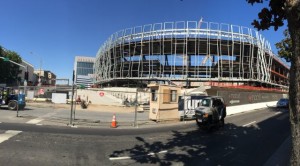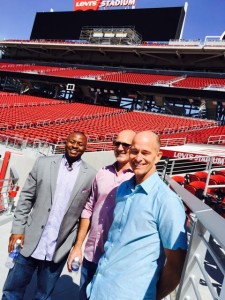
Golden 1 Center in Sacramento taking shape earlier this summer. All photos: Paul Kapustka, MSR (click on any photo for a larger image)
As previously reported by Mobile Sports Report, Ruckus gear will be used in the Wi-Fi deployment not just at the 17,500-seat Golden 1 Center, but also in the surrounding area, which is supposed to include a new public plaza and other developments, including hotel, office, housing and retail space. In the press announcement of all the tech underpinnings the Kings do not state exactly how many Wi-Fi APs will be in the stadium proper but instead say that there will be “more than 1,000” APs in both the stadium and surrounding plaza and developments. UPDATE, 1/10/16: The Kings have responded to clarify, saying there isn’t yet an exact AP count but density is expected to be in the area of one AP per 15 seats, which would put the final total well over 1,000 APs and easily be the most APs for a Wi-Fi deployment in any basketball/hockey arena we know of, and perhaps the most dense of any sporting venue (for now).
Since we’re nit-picking we’ll also question the Kings’ claim that Golden 1 Center will be “the first arena in the world to implement wide-band, multimode fiber technology” on the backbone, a curious claim since the fiber-based network at Texas A&M’s Kyle Field is already operational (and working quite well). UPDATE, 1/10/16: The Kings have responded and say that their implementation differs from Texas A&M’s passive optical network; we will provide further details and comparisons in the near future.

The DGP team at Levi’s Stadium for a summer interview included, L to R, Derek Cotton, director of engineering; Steve Dutto, president; and Vince Gamick, VP and COO. These guys are probably smiling again now that DGP will be part of the Golden 1 Center deployment.
If there is an outlier to the deal it’s the Wi-Fi presence of Ruckus, which has had a tough year when it comes to potential stadium deployments. First Ruckus had a deal for Wi-Fi at the new San Jose Earthquakes soccer stadium but lost that when Avaya booted Ruckus off the pitch by purchasing naming rights to now-Avaya Stadium for $20 million. More recently, Ruckus was part of an initial winning bid with integrator 5 Bars for the Wi-Fi deployment at Houston’s NRG Stadium, but was replaced at the last minute by Extreme Networks to unspecified and unconfirmed pressure, most likely by the NFL. On the plus side, Ruckus gear was used for the Wi-Fi deployment at Angels Stadium in Anaheim, as well as at Indian Wells Tennis Garden, site of the big spring pro tennis tourney.
We will try to fill in more blanks and details during Ranadive’s appearance Thursday (like who will be designing the team app, which we are guessing might be VenueNext), but the real proof of the Golden 1 pudding won’t come until October, since you never can tell how a stadium network will work until it’s turned on for a full house of device-holding fans. That’s why we don’t put much stock in theoretical claims, like the Kings’ ridiculous promise that the network can handle “over 500,000 Snapchat posts per second” — that’s some fast fingers for a full house of 17,500, no? When it comes to feeds and speeds we are firmly in the show-me house, so we hope the Kings and Golden 1 Center will be as open with their real-world statistics come next fall as they are with press-release superlatives now.






